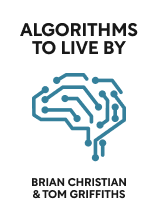

This article is an excerpt from the Shortform book guide to "Algorithms to Live By" by Brian Christian and Tom Griffiths. Shortform has the world's best summaries and analyses of books you should be reading.
Like this article? Sign up for a free trial here .
Do you know what makes you happy in life? How do you know whether a certain choice or decision will make you happy in the end?
You never know for sure whether a certain path is going to make you happy in the end. According to Brian Christian and Thomas Griffiths, the authors of Algorithms to Live By, computer science has the answer to this dilemma: to maximize happiness in your life, pursue whatever opportunity has a chance to be the greatest.
Here is why to maximize happiness, you need to put your faith in the unknown.
Life Is a “Multi-Armed Bandit” Problem
Christian and Griffiths frame life as a complex “multi-armed bandit” problem, referring to a model computer scientists use in machine learning. The multi-armed bandit is a theoretical experiment in which one decision-making agent is presented with a row of slot machines (“one-armed bandits”) and must determine how to maximize their winnings without knowing the odds for any machine. The agent must try out different machines and learn from the outcomes to figure out which will pay off the most.
To do so, the agent strikes a balance between using the machines that have proven to pay out in the past and trying new machines to see if they pay out more—balancing “exploitation” and “exploration,” as they say in computer science.
Christian and Griffiths argue that life works in much the same way. The only way to know for certain if something will make you happy is if you try it for yourself. This could be a place to live, a relationship, or a career—life is about spending more time on the things that make you happy and less on the things that don’t.
Just like in the multi-armed bandit problem, you have to find a balance between trying new things and staying in your comfort zone. The question is: How much of each is best?
| Can We Really Measure Our Own Happiness? Some challenge Christian and Griffiths’s claim that humans can quantify and systematically maximize happiness like a computer following a multi-armed bandit algorithm. Christian and Griffiths assume that people know what makes them happy and will rationally spend more time on the activities that make them happier. In reality, this isn’t necessarily true. In Flow, psychologist Mihaly Csikszentmihalyi describes a study in which his team asked participants to report what they were doing and how they were feeling at random times throughout the day. When the participants were engaged in challenging situations, they reported feeling “motivated” and “strong”—a positive state of mind Csikszentmihalyi terms the “flow state.” Conversely, when they lacked challenges, the participants felt “weak” and “dissatisfied.” Overall, the participants reported being far happier in the flow state. On average, participants reported being in flow 55% of the time at work and only 18% during leisure hours. However, even though they reported being happier at work, the participants universally expressed a desire for more leisure time. Arguably, if these participants got their wish and no longer had to work, these results indicate their overall life satisfaction would decrease. In other words, these people didn’t know what made them happy—so much so, they wanted less of it. This is one example of how human problems (“How do I live a good life?”) may not be as straightforward and solvable as computer problems, despite Christian and Griffiths’s claims to the contrary. |
The Algorithm and Why It Works
Christian and Griffiths describe the closest thing to an optimal solution to this problem that computer science has to offer. In 1985, some mathematicians developed a new approach to the multi-armed bandit problem with the goal of minimizing regret, that is, making it the agent’s first priority to prevent valuable missed opportunities.
Christian and Griffiths explain that the most successful algorithms at accomplishing this goal are known as “Upper Confidence Bound” algorithms. These algorithms recommend making decisions based on your options’ best-case scenarios. Pursue whatever opportunity in life has the potential to pay out the most, even if you think a jackpot is extremely unlikely, since the only way to know for sure whether or not it’ll pay off is to test it yourself. Then, if you’ve given something a shot and determined that it’s not worth your while, adjust accordingly and shoot for the moon somewhere else.
Christian and Griffiths suggest you practice this by putting greater faith in the unknown. When you know nothing about a situation—for example, if you’re set up on a blind date or offered an intriguing but unfamiliar job—act as if the best-case scenario is going to happen.
Additional Instructions
Rule #1: As your remaining opportunities decrease, experiment less.
One exception to this rule depends on the interval of time you have left to make decisions. Christian and Griffiths state that the value of new discoveries decreases as you run out of time to take advantage of them. Old favorites, on the other hand, are never going to get any worse.
As a result, Christian and Griffiths argue that you should eagerly explore the unknown until a certain point, then do nothing but revel in the favorites you’ve already discovered. If it’s the last day you have with your best friend before they move away, you’re better off spending time with them instead of meeting up with a stranger from a dating app.
Christian and Griffiths note that this correlation between experimentation and time is reflected in the stages of human life. Young children do nothing but explore and experiment. Parents and caretakers provide kids everything they need so they can be free to discover what activities and behavior are most likely to make them happy.
In contrast, elderly people typically quit experimenting altogether. They don’t usually try to meet new people, instead spending most of their time with the close friends and family that they already know will make them happy. Christian and Griffiths argue that this is why studies show that older people are more satisfied with their social lives and overall well-being than young adults. They’re reaping the rewards of a lifetime of successful experimentation.
| The Enduring Value of Exploration Christian and Griffiths make the case that at a certain point, you should stop exploring because you don’t have as much time to take advantage of new discoveries. However, some argue that the act of exploration is fulfilling in and of itself, even if you’re unlikely to discover something life-changing. Earlier, we discussed the flow state—the feeling of total immersion in the task at hand—and how it’s one of the chief sources of overall life satisfaction. Getting in the flow state requires a certain degree of difficulty: the learning curve and uncertainty involved in trying something new. Unlike machines, we can’t maximize the value in our lives by doing the same thing over and over again—so, despite what Christian and Griffiths say, it may be best to never stop exploring. |
| Is the Tranquility of Old Age Really Due to Less Exploration? The lifelong shift away from experimentation that Christian and Griffiths describe isn’t the only existing theory as to why the elderly report greater life satisfaction. Research indicates that older people may simply acquire a healthier mindset as they age which makes it easier to cope with stressful situations. In the wake of the 2020 Covid-19 pandemic, all age groups were uniformly faced with the same struggles—cut off from loved ones and fearful of the dangers of a worsening pandemic. Researchers theorized that if the elderly were happier because of their chosen lifestyle, as Christian and Griffiths claim, then they would report being just as stressed as younger adults once the pandemic put them in the same, totally new (arguably “experimental”) situation. However, the older population maintained their relatively high feelings of life satisfaction throughout the pandemic, indicating that the source of this emotional stability is entirely internal. |
Rule #2: Trust your past experience more than you want to.
Christian and Griffiths cite studies showing that humans tend to explore and experiment beyond what is optimal, unduly trusting what is new and neglecting to take full advantage of opportunities that have proven to be reliable in the past. For example, if the average person were trying out a new pop-up clothing shop, comparing it with the stores they already shop at, they would typically flip-flop between the two instead of figuring out which is better and sticking with it—even if the new store sells them cheaply-made clothes.
However, the authors propose that this human tendency may be more rational than the studies indicate, given the fact that we live in a constantly changing world. It’s often worth giving previously disappointing experiences a second chance in case things have gotten better. Just because one item from the clothing store fell apart after a week doesn’t mean that all of them will.
Despite this, Christian and Griffiths make the case that in today’s world, the payoffs for various options in our lives change less than ever before. Mass production and corporate standards mean that the products and services you choose to buy will be remarkably consistent. According to the authors, your instinct to over-explore is more likely to harm than help you.
Consequently, when you’re making decisions that matter, it’s worth overriding your instincts and trusting the objective records of your past experience. If you got salmonella from a food truck, it’s unlikely you’ll have a satisfying experience eating there again.
| The Treadmill of Endless Exploration According to Christian and Griffiths, the human instinct to over-explore explains our bias toward what is new. In Antifragile, Nassim Taleb similarly criticizes this bias, which he calls “neomania.” According to Taleb, neomania inevitably leads to a “treadmill effect”—the constant pursuit of whatever is newest. Instead of searching for lasting value and sticking with it, you crave the satisfaction of upgrading to something new. As such, you can never be satisfied. This is another reason why Christian and Griffith’s suggestion to trust your past experience may be good advice: Focusing on the good things you’ve already discovered keeps you from endlessly obsessing over inconsequential changes. Part of the reason modern companies stick to the same corporate standards for years, as Christian and Griffiths note, is that they too have realized the value of escaping the treadmill of endless change. For example, despite massive company growth, Jack Daniels whiskey maintains the same distillation process responsible for years of their product’s success, sourcing their water from the same Tennessee spring. On the other hand, companies with a winning product that seek change for its own sake (the treadmill effect) often end up shooting themselves in the foot—as the legendary failure of Coca-Cola’s 1985 “New Coke” illustrates. |

———End of Preview———
Like what you just read? Read the rest of the world's best book summary and analysis of Brian Christian and Tom Griffiths's "Algorithms to Live By" at Shortform .
Here's what you'll find in our full Algorithms to Live By summary :
- How to schedule your to-do list like a computer
- Why making random decisions is sometimes the smartest thing to do
- Why you should reject the first 37% of positions in your job search






